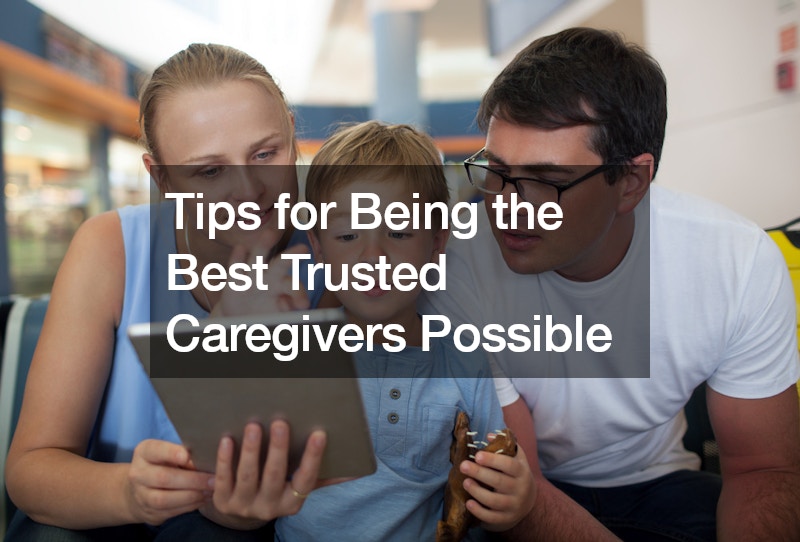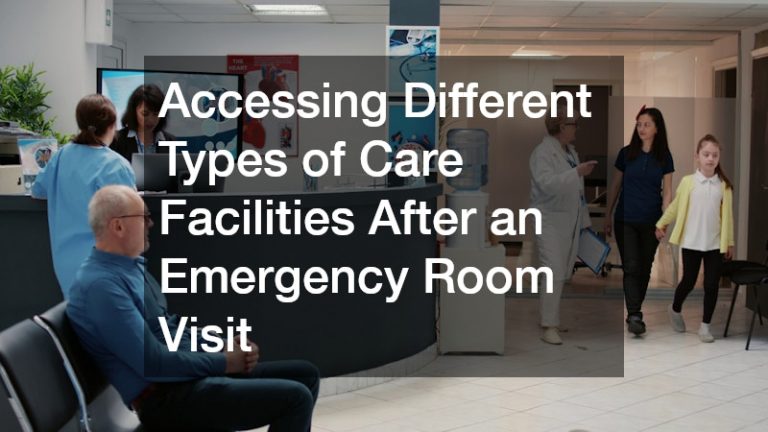Caring for someone, whether it’s a family member, friend, or client, is a role that’s as rewarding as it is challenging. Suppose you’re stepping into the shoes of trusted caregivers. In that case, you must arm yourself with compassion and the right skills and knowledge to make your care proficient and impactful. From understanding the unique needs of those you’re looking after to mastering the art of communication, there’s an array of areas to focus on. In this guide, we will share practical tips to help you excel in your caregiving role, ensuring you’re not just meeting the basic needs but truly enriching the lives of those under your care.
1. Research Some Different Primary Care Physicians
When you’re stepping into the role of a trusted caregiver, finding the right local primary care physician can make all the difference. These medical professionals are not just healthcare providers but partners in the caregiving process. It’s vital to seek out those with a stellar reputation and understand the unique dynamics of caregiving. They should be individuals you can trust, exhibit patience, and are willing to collaborate on care plans.
Choosing a primary care physician involves more than a simple Google search. It’s about identifying someone with the necessary expertise and a compassionate approach to suit the specific needs of those you care for. It is crucial to engage with caregivers and their willingness to listen and adapt to their loved ones’ evolving health needs. A good physician recognizes the importance of your role and values your insights as a caregiver.
Setting up initial meetings with potential physicians is a proactive step toward ensuring a fruitful partnership. These interactions allow you to gauge their compatibility with your caregiving philosophy and assess their communication style. Remember, you and your chosen primary care physician form a team dedicated to providing the highest quality care, reinforcing the trust and reliability expected of caregivers.
2. Determine When Rehab is Necessary

Identifying the right time to seek brain injury rehabilitation is a critical decision that trusted caregivers must make, balancing the individual’s current capabilities with their potential for recovery. It’s essential to watch for signs that indicate a decline in their usual abilities or a plateau in their recovery process. Early intervention in rehab can be pivotal in enhancing the quality of life and expediting recovery, making it crucial for caregivers to stay informed and vigilant.
For caregivers, understanding the specific needs and rehabilitation processes associated with brain injury is paramount. Each case of brain injury is unique, and the path to recovery can be complex and varied. Engaging with healthcare professionals to understand the available rehab options, their benefits, and potential outcomes is crucial. It’s about proactively seeking the best possible care and advocating for the needs of those under your wing.
Involving the person in need of rehabilitation in the decision-making process, to the extent that they’re able, helps align their recovery goals with the chosen rehab strategies. Caregivers should create a supportive environment that encourages positive attitudes and resilience. Choosing the appropriate time for brain injury rehab is not just about physical recovery; it’s also about fostering hope, improving quality of life, and rebuilding independence with dignity and respect.
3. Discuss Addiction Treatments Available
Once the decision is made to seek help, finding a local addiction treatment center that aligns with the patient’s needs becomes the next step. Trusted caregivers must do their research, focusing on facilities that offer comprehensive programs tailored to the individual’s specific addiction issues. These centers often provide a blend of medical detox, counseling, and aftercare planning to ensure a holistic approach to recovery.
Caregivers play a crucial role in supporting their loved ones through the recovery process. They must stay involved, offering encouragement and understanding as the patient navigates the challenging path of overcoming addiction. By maintaining open lines of communication with the treatment center and ensuring that the patient’s needs are being met, caregivers can significantly influence the success of the treatment.
Choosing the right addiction treatment path is a collaborative effort that should involve the patient, their caregivers, and medical professionals. Caregivers should advocate for treatments that not only focus on the physical aspects of addiction but also address underlying psychological factors. This comprehensive approach is essential for lasting recovery, again proving caregivers’ invaluable role in rehabilitation.
4. Speak Openly About Pain Options

In navigating the complex terrain of addiction recovery, trusted caregivers need to engage in candid discussions about pain management options. This involves considering unconventional but increasingly accepted methods, including consultations with a marijuana doctor. Through an open dialogue, caregivers can explore all avenues of pain relief, ensuring that decisions are made in the patient’s best interest.
Incorporating alternative pain management strategies doesn’t negate traditional approaches but broadens available options. Marijuana doctors, for instance, can provide insights into how medical cannabis might fit into a comprehensive pain management plan. This approach allows caregivers and patients to make informed choices that align with the patient’s values and medical needs.
Caregivers are pivotal in supporting patients as they weigh their pain management options. By fostering a supportive environment that encourages open discussion, caregivers help demystify the process of consulting with professionals. Through these heartfelt, informed conversations, the path to recovery becomes clearer, making the caregiver’s role invaluable in the healing process.
5. Remove Dangerous Pests
Ensuring a person’s living environment is as safe and comfortable as possible is crucial when caring for them. That’s where a reliable pest control service comes into play. Trusted caregivers should proactively identify and eliminate pest threats to prevent health risks associated with infestations.
Pests like rodents, cockroaches, and mosquitoes can carry diseases that are particularly harmful to individuals with compromised health. By collaborating with reputable pest control services, caregivers can take an essential step in safeguarding the health of those they’re looking after. It’s not just about eliminating pests but promoting a clean and healthy living space that contributes to patients’ overall well-being.
Furthermore, regular pest control checks can provide peace of mind for caregivers and patients, ensuring the living environment is conducive to recovery and comfort. Caregivers understand the significance of such preventive measures and diligently implement them. This attention to detail is a testament to their comprehensive care, making every effort to ensure a safe and nurturing environment.
6. Rent a Dumpster to Remove Clutter

In creating a comfortable living space, trusted caregivers understand the need to remove clutter that can hinder a patient’s recovery environment. Dumpster rentals offer a convenient and efficient solution to this problem, allowing for the disposal of non-essential items, thus improving the safety and accessibility of the home. It’s a practical step that enhances the living conditions and reduces stress for caregivers and their patients.
By choosing to rent a dumpster, caregivers can tackle the task of decluttering without feeling overwhelmed. This strategy is especially useful when managing belongings that have accumulated over time, which can seem daunting at first. Dumpster rental companies provide the flexibility to work through the house comfortably, ensuring the clean-up process is thorough and not rushed.
Committing to a clutter-free environment benefits patients by minimizing the risk of accidents and increasing mobility around their living space. Caregivers recognize the importance of this approach in promoting a healthier, more organized home. It’s about making the space more livable and less stressful, making dumpster rental companies valuable in their caregiving toolkit.
7. Organize Your Belongings
Trusted caregivers often find that organization is key when maintaining an orderly patient environment. Consulting with storage shed builders can create additional space perfect for storing items that are not needed daily but still hold value. This step clears the home’s space and keeps belongings safe and accessible.
Creating an efficient storage solution is critical for simplifying the caregiving process. Caregivers can work alongside storage shed experts to design a shed that complements the home’s aesthetics while offering practical benefits. It’s an investment in creating a more streamlined, less cluttered environment, which, in turn, contributes to a more stress-free living situation for both the caregiver and the patient.
The collaboration between caregivers and storage shed experts demonstrates a commitment to maximizing patient comfort and safety. This proactive approach to organization reduces hazards and improves the overall functionality of the living space. It shows that effective caregiving extends beyond health and wellness, including creating an optimal living environment.
8. Waterproof Your Home to Avoid Mold

Ensuring a home is waterproofed is another critical aspect of creating a safe environment for patients. Trusted caregivers should consider hiring a waterproofing service to prevent moisture buildup, a common cause of mold and mildew. This proactive step can significantly enhance the air quality in the home, making it safer and more comfortable for both the caregiver and the patient.
By incorporating waterproofing measures, caregivers can prevent the long-term health risks associated with mold exposure, such as respiratory issues and allergic reactions. Waterproofing services can identify potential problem areas in the home and recommend solutions to keep the living space dry and mold-free. It’s an essential service that shows a caregiver’s commitment to maintaining a clean and health-friendly environment.
Waterproofing a home protects the structural integrity of the property and safeguards the health of those living in it. Caregivers understand that part of their role is ensuring the living space is conducive to their patient’s well-being. Engaging in professional waterproofing solutions helps fulfill this responsibility, making it a smart investment for caregivers dedicated to providing the highest level of care.
9. Keep Your Home at a Comfortable Temperature
Maintaining a comfortable temperature in the home is key for caregivers looking to provide a safe and pleasant environment for their patients. Local HVAC repairs can sometimes arise unexpectedly, so ensuring the heating, ventilation, and air conditioning system is running smoothly is crucial. Trusted caregivers recognize the importance of a well-regulated temperature in promoting patient comfort and preventing health issues related to extreme heat or cold.
A home’s comfort level can significantly affect a patient’s mood and overall well-being. When an HVAC system fails, caregivers should act promptly to address the issue, seeking HVAC repairs from reputable service providers. This proactive approach keeps the home environment comfortable and demonstrates the caregiver’s commitment to their patient’s health and happiness.
Moreover, regular home HVAC system maintenance can prevent unexpected breakdowns and ensure the air quality remains high and free from pollutants and allergens. Caregivers prioritizing a comfortable temperature show they are dedicated to all aspects of their patient’s care. It’s a thoughtful investment in the patient’s comfort and a testament to the caregiver’s thorough approach to their role.
10. Protect Your Loved Ones
Hiring a local fence contractor can significantly enhance the safety of your home, a priority for trusted caregivers striving to protect their loved ones. A sturdy, well-built fence secures the perimeter. It provides peace of mind, knowing patients are safe from wandering off or unexpected intrusions. Creating a secure environment where loved ones can enjoy outdoor spaces without compromising their safety is essential.
In addition to physical safety, a well-designed fence can contribute to the well-being and comfort of those under your care. Caregivers understand that a sense of security is fundamental to a patient’s emotional health. Working with a fence contractor to customize fence options allows caregivers to address specific safety concerns while enhancing the home’s aesthetic appeal.
Establishing a secure boundary around the property demonstrates a caregiver’s commitment to their role. It’s an investment in the safety and security of their patients that goes beyond the basic responsibilities. Caregivers know that peace of mind is priceless, making this decision not just a practical measure but a testament to their dedication to providing the best care possible.
In conclusion, being a trusted caregiver entails more than just fulfilling basic needs; it requires compassion, skill, and dedication to enrich the lives of those under your care. Whether it’s finding the right primary care physician, deciding on rehab options, or discussing addiction treatments and pain management, caregivers play a crucial role in advocating for their loved ones’ well-being. Caregivers create safe and comfortable living spaces that promote healing and enhance overall quality of life by proactively addressing environmental factors like pest control, clutter, organization, waterproofing, and home temperature. Additionally, investing in fencing reinforces the caregiver’s commitment to protecting their loved ones, ensuring peace of mind and security for all involved.




